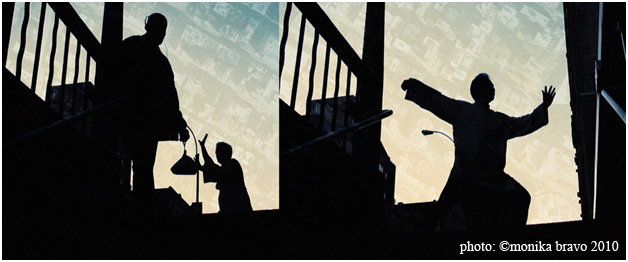
Philip Glass and I were seated on the podium at the Rubin Museum of Art after the screening of my film, Taiji on 23rd Street. Philip had scored the music for the short film that I had been its director and performer. Unbeknown to us, the RMA had been hosting a series of discussions on the theme "Talk About Nothing" on which a long list of distinguished speakers had been asked to share their thoughts: Laurie Anderson, Karen Armstrong, Lama Surya Das, Robert Wilson and many others. After the film, we were asked to participate in a brief Q&A session around this very topic. About twenty minutes into the discussion, I gazed out at my own family seated amongst the audience, their eyes beaming with expectation for words of wisdom to issue forth from us. I shuddered imperceptibly. "O Buddha, I am truly empty of any insight whatsoever. My mind is utterly blank. " I whispered to Philip, beseeching his help.
Fortunately, most of the questions were directed to Philip. A young man with smooth chiseled features wearing a black sweater threw down the question like a gauntlet into the ether, "Where does the source of your music originate?"
"Since the nature of the self is inherently empty of an absolute existence..." Philip must have paused for almost 30 heartbeats before continuing, "...then, for me, music serves as a place." His words had the effect of pebbles thrown into a still pond. I could feel the widening rippling effect of his words upon the audience. Waves of confusion, understanding, and questioning emanated from those who listened.
Wishing to help interpret Philip's revelation, I added that Taiji movements also serve as a place for the practitioner to stand within this inherent emptiness. "When I move, I do not in any way try to actively engage in the movement, but rather I let my mind empty out then the act of motion spontaneously arises of itself without my own volition." I added, "In a sense, I merely follow the internal combustion of the Qi/energy flow." I could almost hear an audible sigh of relief from the audience.
I have worked with Philip Glass for almost fourteen years now as his Taiji and qigong teacher. Often, after our class, we share a bowl of the most delectable vegetarian soup cooked by my wife, Janet. Philip calls it "poetry in soup" and I whole-heartedly agree. Over our meal, we would chat on a wide range of topics from music to the spiritual cultivation that, unknown to the public; Philip is vigorously disciplined and dedicated in his daily practice.
Throughout the years, I have learned Philip's language. His insight into music as a place arises from a deep visceral experience that is as concrete as the table in front of him. This profound realization is not so easily attained -- it comes from many arduous years of study and practice. Many of the ancient arts, of which both traditional music and Taiji are a part, serve as a place where fundamental truths could be perceived. Music as a way towards self-knowledge is still preserved in Indian culture and his teacher/mentor Ravi Shankar has implanted this seed of sacred music in him. Philip communicates something of this tradition through his compositions and in the topics he has explored -- Gandhi, Song of Milarepa, or Einstein on the Beach. Music might appear ephemeral to most of us, but to Philip it is solid, tangible. His direct perception of the materiality of music is so clear in his symphonies that I can almost touch the lush resonance of the strings, the deep brass tone or the chirping of a pure soprano voice. These sounds are like the ancient yogic mantras penetrating and affecting me in mysterious ways that I do not yet fully comprehend. As in the Vedic sacred text, the universe begins with a single sound of AŮM.